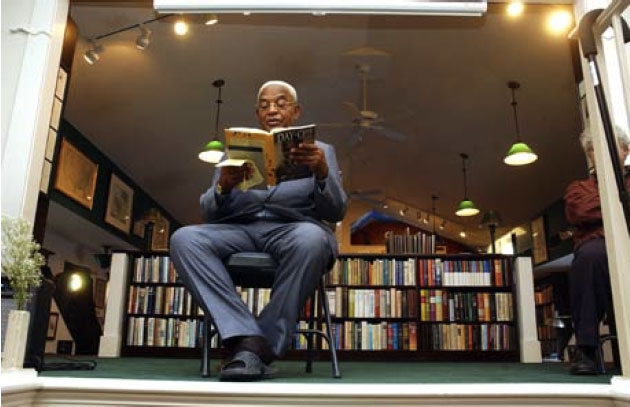Du Bois awards credit pioneers
 GREAT BARRINGTON — Irving Burgie, a singer-songwriter and civil rights activist who penned Harry Belafonte’s most famous songs, said he hadn’t planned on a music career when he began learning to play guitar while serving in the Army. “The songwriting came much later,” he said.
GREAT BARRINGTON — Irving Burgie, a singer-songwriter and civil rights activist who penned Harry Belafonte’s most famous songs, said he hadn’t planned on a music career when he began learning to play guitar while serving in the Army. “The songwriting came much later,” he said.
Burgie, perhaps better known as Lord Burgess for his calypso music and collaborations with Belafonte, received the 2007 Pioneer Award at the W.E.B. Du Bois Center during its first anniversary celebration yesterday.
The center honored Burgie for his “staggering” music career, in which he sold 100 million recordings, and for his political activism alongside such leaders as the Rev. Martin Luther King and Medgar Evers. It also presented an award to Richard Chrisman, an adjunct English professor and forum coordinator at Berkshire Community College.
The awards quoted from the Oxford English Dictionary: “One who … opens the way for others to follow.”
Chrisman said he was honored for being credited for “creating an open space at BCC where people can dialogue about important issues, such as the pre-emptive American issue of slavery.”
Randy Weinstein, the center’s founder, said he met Burgie last summer when he stopped by the center during his visit to the Berkshires. Weinstein said they talked for hours, exchanged contact information and developed a friendship.
After the awards presentation, Burgie read excerpts from his new autobiography, “Day-O!!!” so named from his famous song of the same title. The song was one of 11 songs Burgie wrote for his first album with Belafonte, “Calypso.” The album was the first to sell a million copies in American music history and remained No. 1 on the Billboard charts for 32 weeks.
Burgie also read from passages pertaining to racial inequality.
The integration of African-Americans in the military during the war marked the early beginnings of the civil rights movement, Burgie noted. He emphasized the importance of this accomplishment, which abolitionists and early civil rights leaders such as Frederick Douglass had long sought.
Burgie, when asked by an audience member, said that Jackie Robinson’s becoming the first black American in baseball was “a natural outgrowth” of the war and prompted “the early stages of the civil rights era.”
Another audience member, Maurice Paris, said he felt music contributed a great deal to the movement and helped create peace between the races. “Music perhaps was the greatest force for breaking the racial divide at the time,” he said.

